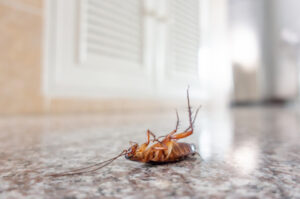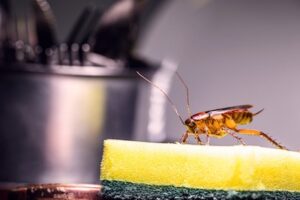Cockroaches are known to be resilient pests that can invade your home, causing discomfort, damaging your belongings, and potentially spreading diseases. They are unwanted guests that require immediate attention once discovered. If you find yourself in this predicament or simply wish to prevent an infestation, here’s a comprehensive guide on how to keep roaches out of your house.
How to Keep Roaches Out of Your House
If you have a severe cockroach infestation, it can be difficult to get rid of the infestation by yourself, but it’s not impossible! Generally getting rid of a cockroach infestation boils down to making your home uninviting to roaches by keeping the home tidy and clean, putting down a perimeter cockroach treatment, and using cockroach bait traps in unison. Below you’ll find what has worked for me when it comes to getting rid of cockroaches!
Step 1: Cleanliness is Key
Cockroaches are scavengers and are attracted to any available food sources. Regular cleaning is the first step to discouraging roach infestations. Maintain a clean kitchen, taking care to wash dishes immediately after use, wiping down counters, sweeping floors, and clean up any food spills promptly. Similarly, regular bathroom cleaning is also necessary, and taking out the garbage and sealing the garbage cans is key. However, you should also consider hiring a local pest control company if the problem is getting out of hand, and then make sure to keep your home clean.
Step 2: Seal Up Entrances
Cockroaches are remarkably flexible creatures capable of squeezing through tiny cracks and crevices. This ability makes it important to seal potential points of entry like cracks in walls, gaps in windows and doors, spaces around pipes, and any other crevices using caulk or other sealants. Regular inspections of these areas can be beneficial in maintaining a roach-free home.
Step 3: Dryness is a Deterrent
Roaches need water to survive, and they’re attracted to moist areas. Ensure that there are no leaky pipes or faucets in your home. Dry out sinks, bathtubs, and showers as much as possible. Keeping your home dry as much as possible, especially in areas such as the kitchen and bathroom, can help discourage roach activity.
Step 4: Store Food Properly
Roaches are scavengers and are attracted to unsealed food. Make sure you store food in sealed containers, including pet food. Keep your pantry and refrigerator clean and free from spilled or spoiled food.
Step 5: Declutter
Cockroaches love to hide in cluttered areas. Keeping your home free of clutter will limit their hiding spaces and breeding grounds. Remove old newspapers, empty boxes, and other unused items. Regularly cleaning and decluttering your home can reduce the chance of a roach infestation.
Step 6: Use Roach Baits and Traps
Baits and traps are effective ways to deal with roaches. The roaches are attracted to the bait, consume it, and carry it back to their nest, where it kills other roaches. Place these baits and traps in areas where you have noticed roach activity. This is a more humane and less toxic way of controlling roaches compared to sprays. Some people have also had success with cockroach foggers.
Step 7: Seek Professional Help
If a roach infestation becomes too much to handle on your own, it’s time to call in the professionals. Pest control services have the experience and resources to effectively deal with roach infestations and can provide advice on how to prevent future infestations.
Preventing roaches from infiltrating your home is certainly more preferable than having to deal with an infestation. By maintaining cleanliness, sealing entrances, keeping areas dry, storing food properly, decluttering, and using roach baits and traps, you can effectively discourage roaches from turning your house into their home.
It is crucial to take action immediately upon spotting signs of an infestation. Time is of the essence in preventing roaches from multiplying and causing more significant issues. Don’t hesitate to seek professional help if the problem becomes too overwhelming. Remember, prevention is always better than cure.

Why Are Roaches Attracted To My Home?
Cockroaches are attracted to homes for a variety of reasons, generally related to their basic survival needs: food, water, and shelter. Here are some specific factors that make your home attractive to these resilient pests:
1. Food
Roaches are omnivorous and not very picky about what they eat. They’re attracted to food particles and residue, including crumbs on the floor, leftover food on dishes, unsealed food in your pantry, and even pet food. A readily available food source is a significant draw for these insects.
2. Water
Like all living organisms, roaches need water to survive. They’re attracted to any areas of moisture or standing water. This could include a dripping faucet, leaky pipes, a water dish for pets, or even a wet toothbrush in your bathroom.
3. Shelter
Roaches seek out warm, dark, and humid spaces to breed and hide. Clutter, such as stacks of newspapers, boxes, or unused items, provides perfect hiding spots. They also like cracks and crevices, behind appliances, and under sinks, which offer them protection from predators and a safe place to lay their eggs.
4. Warmth
Cockroaches prefer warm environments, which is why they often infest homes. They are especially attracted to areas like kitchens and bathrooms, where there is both warmth and water.
It’s worth noting that even the cleanest homes can sometimes have a roach problem. These pests are very resilient and opportunistic, capable of exploiting even the smallest resources for survival. However, maintaining a clean and dry home, properly storing food, and sealing potential points of entry can significantly help reduce the likelihood of a roach infestation.

Are Cockroaches Dangerous?
Yes, cockroaches can pose several risks that make them a public health concern. While they are not directly aggressive or harmful to humans, their presence in our homes can lead to several health issues:
1. Allergens
Cockroaches produce allergens that can trigger allergic reactions in some people, leading to skin rashes, sneezing, watery eyes, and even asthma attacks. These allergens are typically found in cockroach feces, shed skins, and body parts that can be spread around your home.
2. Disease Spread
Cockroaches are known to carry numerous pathogens that can cause diseases in humans. They can transmit bacteria like E. coli and Salmonella, which can lead to gastrointestinal problems like food poisoning and diarrhea. While cockroaches are not the primary way these diseases are spread, their potential role in transmission is concerning.
3. Asthma Trigger
For people with asthma, especially children, the presence of cockroaches can significantly exacerbate the condition. The allergens produced by cockroaches can trigger asthma attacks and lead to more frequent and severe episodes.
4. Contamination
Cockroaches scuttle through dirt, waste, and decaying matter, then roam around your home, including surfaces where food is prepared or eaten. This behavior can lead to the contamination of your food and surfaces with bacteria and parasites that roaches carry.
While it’s rare for cockroaches to bite humans, they can under certain circumstances, usually when their populations are large, and food sources are limited. However, such incidents are infrequent.
Conclusion
In conclusion, dealing with a cockroach infestation in your home can be a daunting task, but with the right approach, it is possible to eliminate these pests effectively. By implementing a combination of preventive measures, such as keeping your home clean and sealing off entry points, along with targeted treatments like baits and insecticides, you can successfully get rid of cockroaches and create a roach-free environment for you and your family. Remember, consistency and persistence are key in combating these resilient insects, so stay vigilant and proactive in your efforts.
